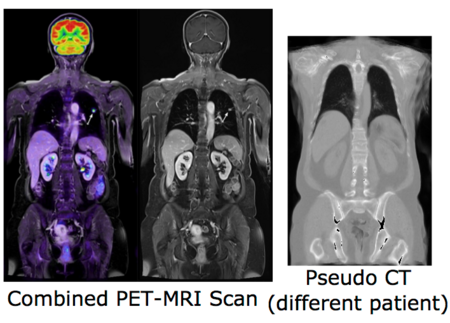MRI-based pseudo-CT synthesis for attenuation correction in PET-MRI and Linac-MRI
Combining positron emission tomography (PET) and within the same scanner magnetic resonance imaging (MRI) has recently evolved into a research topic of great interest, since this new multimodal imaging technique enables improved tumor localization and delineation from healthy tissue compared to conventional PET-CT. Another important emerging research area is the integration of MRI into radiotherapy treatment delivery systems (e.g. linear accelerators, Linacs) to improve the planning of dose delivery and also tracking and correction of tumor motion. Despite its potential advantages, there are a number of challenging problems when replacing CT completely by MRI in radiotherapeutic treatments and PET imaging, in particular the lack of correlation between the measured MRI intensities and the attenuation-related mass densities. However, since in both cases information about the attenuation behavior of the tissue is required, there is a need for synthetic CT scans (so-called pseudo-CTs) based on the acquired MRI scans.
Our previous work on modality-independent neighbourhood descriptors is considered state-of-the-art for multimodal deformable image registration, which is a vital step for multi-atlas-based CT synthesis. Our first published results for image synthesis include a local formulation of the canonical correlation analysis (CCA) for MRI synthesis based on local histograms and multi-atlas registration based MRI-based pseudo-CT synthesis. In this project, we will advance registration-based techniques and combine them with machine learning algorithms to investigate its potential for image synthesis. For this purpose, various multivariate statistical methods, such as the non-linear Kernel-CCA will be analysed. To overcome the lack of a functional relationship between MRI and CT intensities, the consideration of rich contextual image descriptors will be studied. Learning algorithms for detecting and correcting errors in the generation of pseudo-CT scan could also be explored. Following image synthesis, attenuation maps can be directly created based on the synthesized pseudo-CT images and its influence on PET image reconstruction may be evaluated. Due to the limitation of previous work on the generation of attenuation maps mainly for the head, a particular focus of this project is the development of new methods for MRI-based attenuation correction for the whole body.
The project is funded by Graduate School for Computing in Medicine & Life Sciences.
Selected Publications
- Degen J., Heinrich M.P.
Multi-Atlas Based Pseudo-CT Synthesis using Multimodal Image Registration and Local Atlas Fusion Strategies
WBIR2016 - Degen J., Modersitzki J., Heinrich M.P.
Dimensionality Reduction of Medical Image Descriptors for Multimodal Image Registration
Current Directions in Biomedical Engineering, 2015 - Heinrich M.P., Schnabel J., Papiez B.W., Handels H.
Multispectral Image Similarity Based on Local Canonical Correlation Analysis
MICCAI 2014
Project Team
M.Sc. Johanna Degen
Jun.-Prof. Dr. Mattias P. Heinrich
Cooperation Partners
Prof. Dr. Jörg Barkhausen, Klinik für Radiologie und Nuklearmedizin, Universitätsklinikum Schleswig-Holstein, Lübeck
Prof. Dr. Magdalena Rafecas, Institut für Medizintechnik, Universität zu Lübeck

- Research
- AI und Deep Learning in Medicine
- Medical Image Processing and VR-Simulation
- Integration and Utilisation of Medical Data
- Sensor Data Analysis for Assistive Health Technologies
- Medical Image Computing and Artificial Intelligence
- Medical Data Science Lab
- Medical Deep Learning Lab
- Junior Research Group Diagnostics and Research of Movement Disorders
- Former Medical Data Engineering Lab

